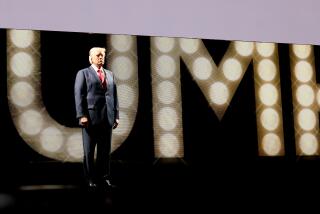GOP Strategy: Build Clout to Last Decades
CLEVELAND — Returning to the 2004 battleground state that kept President Bush in the White House, Republican leaders on Friday plotted strategies that they hoped would sustain their political strength for decades.
But even as state party chairmen and other GOP officials gathered for a conference called “Keep on Growing: Building a Durable Majority,” the day-to-day realities of governing intruded -- highlighting the challenges facing the GOP’s ambitious political goals.
The party leaders took a break from their closed-door workshops on voter turnout, outreach to minority voters and new technology to gather in a hotel bar Thursday night to watch Bush’s prime-time news conference. They nodded in approval as he parried questions about soaring gasoline prices, the teetering economy, public wariness of his Social Security plans and his stalled nominations to the federal courts and the United Nations.
Those issues have contributed to a drop in Bush’s approval rating to below 50% in several recent polls.
“Is there blowback [over the poll numbers] and is this creating concern? Absolutely,” said Christopher McNulty, executive director of the Republican Party in Ohio, where Bush’s narrow victory in November assured his reelection.
But McNulty and others interviewed at the meeting, which concludes today, emphasized that Bush’s popularity with the Republican base remained strong. They said the party’s rank-and-file continued to admire the president for his willingness to grapple with topics that other politicians might choose to avoid.
“The president is leading on the basis of what he believes needs to be accomplished, and when you lead, when you have ideas, when you’re out front, it’s naturally going to cause opponents to react,” McNulty said.
In a sharply worded speech Friday, Republican National Committee Chairman Kenneth Mehlman contrasted Bush’s willingness to take on controversial issues with what he called Democrats’ consistent “carping and criticism.”
“Many of today’s reactionary Democratic leaders aren’t Democrats, they’re elitists,” Mehlman said.
As Mehlman ticked off some of the most vexing issues facing the administration -- Social Security overhaul, the fight over conservative judges, the stalled nomination of would-be U.N. Ambassador John R. Bolton -- he argued that voters would reward a party that aggressively pursued its agenda and ideas, rather than a party that opposed them.
“Conservatism is the ideology of the future,” Mehlman said. “Republicans are driving the course of history with new solutions.... It is the left, including unfortunately many of today’s Democrat leaders, who seek to turn back the clock and obstruct the march of history.”
Underscoring the GOP ambitions to peel away long-standing Democratic Party constituencies such as labor union members, African Americans and Latinos, Mehlman repeatedly quoted Democratic icons -- from FDR to Bill Clinton.
The rhetoric drew angry responses from Democratic officials. A spokesman for Senate Minority Leader Harry Reid of Nevada accused Mehlman of invoking past Democratic leaders to justify “reactionary, right-wing policies that seek to destroy Social Security.”
Mehlman, in his speech, charged that Democratic congressional leaders had shirked their traditions by opposing the idea of letting younger workers divert a portion of their payroll taxes into private accounts -- the hallmark of Bush’s proposed Social Security overhaul. Democrats say the plan would undermine a system that has worked for decades and have refused to negotiate with Bush as long as private accounts are part of his plan.
By invoking Social Security, Mehlman underscored a Republican strategy based on the premise that policy positions that now spark strong opposition may yield long-term political gains.
For example, he has emphasized that Bush’s Social Security proposal could help the GOP recruit young workers, including union members, who have become familiar with the benefits of stock market investments through 401(k) plans.
Democrats convened their state party leaders in a similar meeting three weeks ago in Arkansas. The party’s new national chairman, former Vermont Gov. Howard Dean, used the occasion to announce the first of a series of grants to party organizations in some of the states where their political fortunes had suffered. The party will send $500,000 to Missouri, North Carolina, West Virginia and North Dakota.
But as Democrats attempt such rebuilding efforts, the GOP meeting demonstrated that the party has in place a master plan that already applied to dozens of states viewed as critical to winning presidential elections in the future.
The plan extends the resources and enthusiasm galvanized for the 2004 campaign into a year-round enterprise.
At workshops, Republican leaders, staff members from the White House political office and campaign strategists offered slide presentations hammering home the importance of four priorities to assure long-term success: outreach to minorities and other new GOP voters, exploiting new computer technology to identify and communicate with voters, setting new voter registration goals and mapping more ambitious get-out-the-vote operations.
The party, which registered 3.4 million new voters over the past four years, now aims to register an additional 4 million before the 2008 presidential election -- including 1.5 million before next year’s midterms.
“We’re in full-time campaign mode,” said Carole Jean Jordan, chairwoman of the Florida Republican Party.
More to Read
Get the L.A. Times Politics newsletter
Deeply reported insights into legislation, politics and policy from Sacramento, Washington and beyond. In your inbox three times per week.
You may occasionally receive promotional content from the Los Angeles Times.










